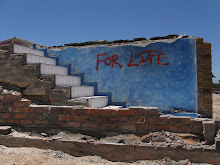I was hoping no one was watching my face – the only white one in the congregation of perhaps a hundred or more. If they had been, they might have seen tears forming in the corners of my eyes. It was the music that did it. When the service was to start, a woman’s voice poured from the front of the church. In response, the whole congregation sang back, improvising harmonies that filled up the sanctuary. Soon, they were on their way. Small cushions were dispersed, which were slapped in time, with complex cadences after each phrase. A djembe joined in, and then a tambourine added heavenly sibilance. It was freedom – the drum and the tambourine would periodically drop out on the player’s whim, parishioners danced in the pews, and everyone contributed their own embellishments to the music. This was my first service at Xenophobia Methodist Church.
That’s how my American friends and I sometimes refer to it, because on the front of the church hangs a large, colorful banner that simply reads,
Xenophobia
Rosebank Methodist Church
No one questions what it is referring to. This May, the word came to public consciousness after attacks on immigrants were carried out across the country. Workers from nearby countries come to South Africa for opportunities, and are seen by locals in the same light that many U.S. Americans see Mexicans workers. Zimbabwe especially has coughed up thousands of emigrants as it faces out-of-control inflation (a Zimbabwean friend showed me a “worthless” 10 million dollar note with an expiration date), and violence following the recent contested election. On May 12th, South Africans lashed out against these foreigners, and the violence spread quickly to other parts of the country, including Cape Town. At least 62 people died, and around 25,000 were made refugees. Churches like Rosebank Methodist did their best to protect, house, and feed them, but were overwhelmed by lack of resources. Other refugees were taken into homes of locals.
Alice, a chatty Zambian woman whom I met at a party, was one of these. A mob of people came to where she had been staying. “The brats,” she said, just as her phone rang. I didn’t get the rest of the story. Now she’s living in relative safety, but she can’t wait to go back to Zambia. Her other experiences in this country have not been redeeming. Once, she applied for a job and was sent for training to a place that was a day-long train ride away. She was made to work in the fields and given very little food. When she decided to quit, the company refused to pay for her transportation home. The police intervened and made them pay for a ticket for the next day. Facing resentment of her fellow workers, she slept in the train station that night. In Zambia, she says, even the Zimbabweans are welcomed.
It doesn’t even make sense, says Joseph, Alice’s host. The people who come here are good workers, and they are paying landlords good money. Local businesses benefit from their presence, whereas South Africans (who, according to another source, tend to be spoiled by hand-outs) contribute less.
It may have occurred to you that I am a foreigner here. This occurred to me, and to my parents, when I was planning my trip. But all of the people targeted have been living in poorer areas. American students are not of interest to the perpetrators, who want to drive out those who they see as taking the jobs they are qualified for. The closest I felt to fear of xenophobia was Tuesday at my first jazz ensemble rehearsal. After I approached the professors to ask about joining an ensemble, they decided to kick out a current student to open up a spot for me. They said his attendance was poor. Apparently they forgot to tell him that he was kicked out, because he showed up to our first rehearsal, and met the American student that was replacing him. I had been concerned about resentment when I heard what the professors decided to do -- American students are often seen as having an entitlement complex. But fortunately, this student was cool with it. “No beef,” he said, and the professor let him play drum set (not his best instrument) for the rehearsal.
Nor did I feel any resentment at church on Sunday. Yes, I felt self-conscious at times, listening silently as the rest of the church was caught up in Xhosa hymns. But I was made welcome. At the Pick n Pay afterward, two churchgoers recognized me and invited me to the Friday youth service. If I don’t go again on Friday, they’ll at least see me again on Sunday. Methodism isn’t necessarily up my spiritual alley, but music carries a theology of its own. Unity is among its tenets. I, a foreigner, felt right at home.
Thursday, July 31, 2008
Subscribe to:
Post Comments (Atom)

2 comments:
Really interesting post - keep blogging. I'm glad you enjoyed the church - I live right opposite one called Trinity African Methodist Episcopalian Church of Zion - I'm ashamed to say I've never been inside but they leave the front door open so I can hear the hymns. Matthew Bradby, London.
When I went to an art portfolio day in high school, I found a booth for a Canadian art school and became super interested. A blue-haired artist/professor and I were chatting about art, and then she mentioned international students. I thought, "What is this random international student talk..?" All of a sudden it hit me that I would be an international student in Canada. What a weird feeling. Anyways, I'm glad you were braver than I to actually become a foreigner, and that things are going well. :)
Katie Schreiber
Post a Comment